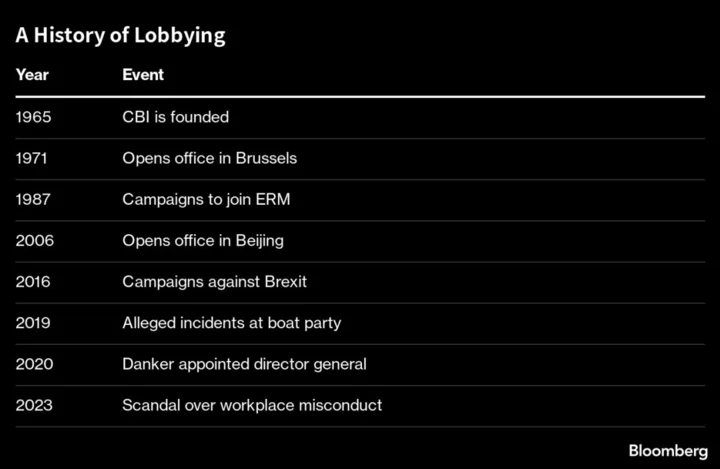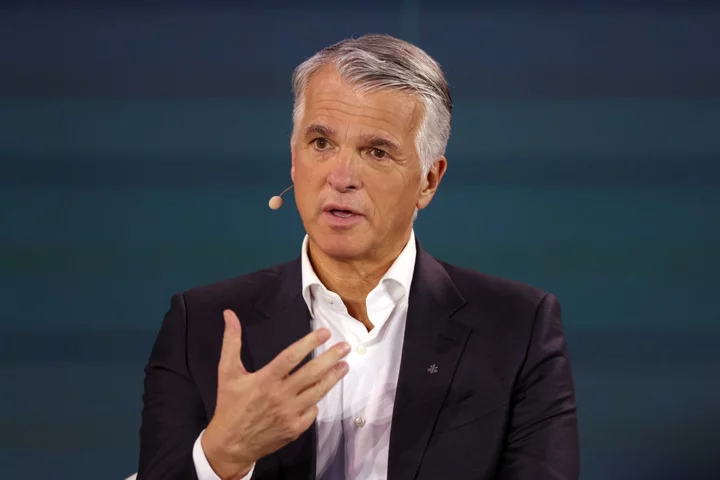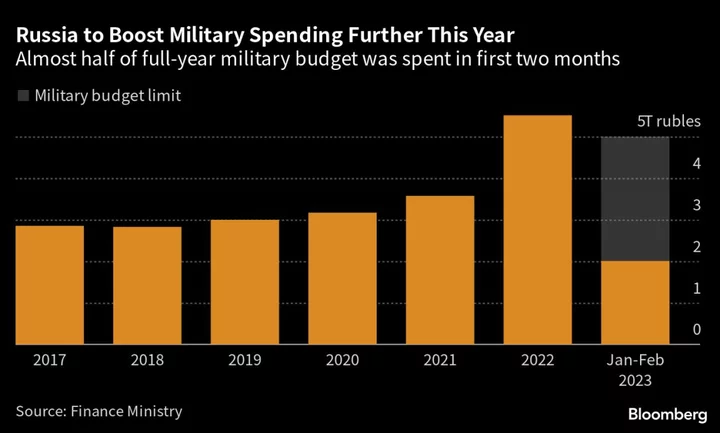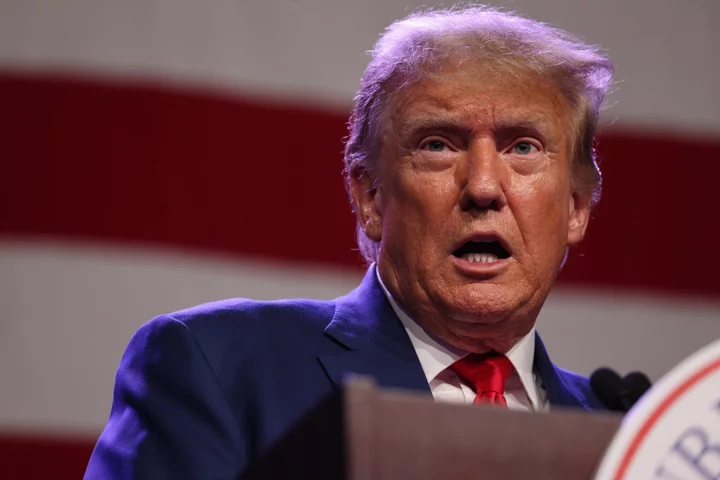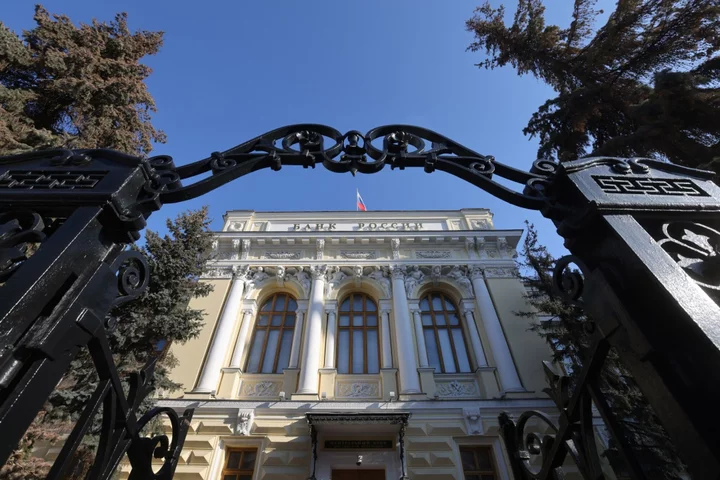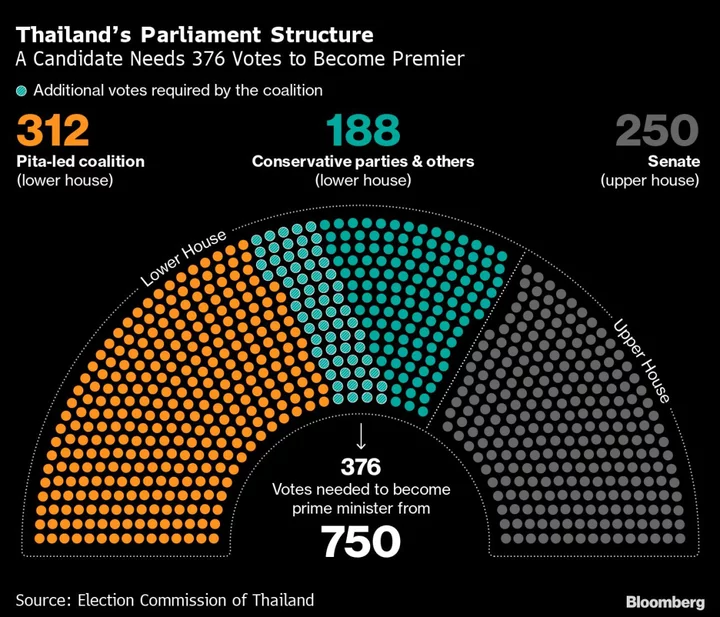The Confederation of British Industry was quick to add its support as the MeToo movement forced businesses across the world to confront the longstanding mistreatment of women.
When lurid details emerged in January 2018 of how prominent figures from politics, business and finance behaved at the President’s Club charity gala at a London hotel, Carolyn Fairbairn, the then chief of the UK’s biggest business lobby group, condemned the event. Female hostesses were told to wear skimpy black outfits and women were reportedly groped and propositioned. It showed “how far we have still to go to stamp out sexual harassment,” she said.
Just how far is now being demonstrated by the CBI, which claims to speak for more than 190,000 companies and has had the ear of the British government for more than 50 years. The organization is unraveling as police investigate two cases of alleged rape and members from insurer Aviva Group Plc to retailer John Lewis Partnership Plc head for the exit.
How the CBI responds before a crisis meeting with its members next month will determine its survival, while the fall from grace of such a venerable institution has reverberated across corporate Britain.
Such scandals, to varying degrees, are far from unique. Insurance market Lloyd’s of London was rocked by allegations of sexual harassment four years ago that led it to clamp down on alcohol consumption.
But the CBI has been caught out by a sea change in Britain’s traditionally clubby, male-dominated corporate culture while at the same time publicly campaigning to promote women to more senior positions and offering executives diversity and inclusion training.
This week, the Guardian newspaper reported allegations of inappropriate behavior toward women by Tesco Plc Chairman John Allan, including while he was president of the CBI — the equivalent of the chairman role at a company — between 2018 and 2020.
The supermarket chain said it was standing by Allan and said it hadn’t received any complaints or concerns. Allan apologized for a comment he made in 2019 at a CBI dinner, while other claims were untrue, his spokesperson said.
“You talk a really good game when it comes to all these programs and campaigns, but then when it comes to your own culture, it completely passes you by,” Ann Francke, chief executive officer at the Chartered Management Institute, a UK group promoting corporate leadership, said of the CBI. “One of the reasons for this is that senior leaders did not know what was going on in the organization. To me, this is a failure of leadership.”
Executives at the confederation said they believed the internal culture was among the best. Police are now probing the alleged rape of a woman in summer 2019 at a CBI staff party on a boat in London.
Another claim comes from a second female CBI employee reportedly being raped by two male colleagues in an overseas office and blaming the confederation for failing to support her.
Fairbairn, who ran the organization as director-general from 2015 until the end of 2020, has said she had no knowledge of the rape allegations or any other incidents of sexual assault during her tenure.
“Any woman facing this kind of shocking abuse deserves nothing but compassion, protection, and the full support of her employer and the law,” she sold the Sunday Times newspaper in an article published on April 22. Fairbairn didn’t respond to emails seeking further comment.
Karan Bilimoria, who was president of the CBI until June last year and remains on the board, said he had “absolutely no inkling” of any problems, adding he was “completely shocked” by the reports. Now he hopes the scandal will help other businesses ensure they have systems in place to protect workers. “The whole of British business can learn from this,” said Bilimoria.
The CBI has been among the loudest advocates of business practices underpinned by environmental, social and governance — or ESG — guidelines in a country where alcohol-fueled workplace socializing is still commonplace and men dominate the corporate suite. Nine of the companies in Britain’s benchmark FTSE 100 Index are led by women, with another — at Diageo Plc — joining the ranks in July.
The CBI’s unraveling began on March 6, when the Guardian newspaper reported that Tony Danker, a former McKinsey consultant who replaced Fairbairn as director general in late 2020, had stepped aside amid an investigation into his conduct.
Danker, 51, allegedly sent unwanted messages to a female employee, some featuring sexually suggestive language, according to the Guardian. The organization hired law firm Fox Williams to investigate. Danker, who apologized publicly on Twitter for making colleagues feel “uncomfortable,” later said he had become the “fall guy” for the crisis.
Weeks later, the Guardian published further reports from more than a dozen female CBI staffers who claimed to have been victims of sexual misconduct by senior figures at the business lobby group, including the woman who alleged she was raped at the boat party. The CBI reported those allegations to the police.
Then a second woman claimed that she was raped by two male colleagues. The woman, who did not report the alleged incident to the police, said the CBI had created an atmosphere where perpetrators had no fear of consequences, the Guardian reported on April 21. In addition to the rape cases, there were allegations of sexual harassment and stalking.
Critics such as Michelle Last, an employment partner at Keystone Law, said the CBI’s leadership “enabled toxic individuals to flourish at the expense of dozens of women.” The CBI has dismissed a number of employees, said it will appoint a chief people officer, and is starting a “root and branch” review of its processes.
Multiple former CBI employees, who spoke to Bloomberg on condition of anonymity, said there were known bullies inside the CBI. Staff felt that if they raised concerns with human resources, no action would be taken, the people said.
CBI President Brian McBride wrote to members to admit the organization had failed to stop such people from being hired and then didn’t fire them when their behavior came to light. “It led the victims of harassment or violence to believe that their only option was to take their experiences to a newspaper,” he wrote in a letter dated April 24.
Rain Newton-Smith, the CBI’s former chief economist who is now leading its fight for survival, said in an interview that there was “clearly something really broken within this organization.” The CBI has been too hierarchical and she wants to change that, she said.
That’s if the organization can continue in its current form. Since the scandal started unfolding, a slew of companies canceled their membership. They include Natwest Group Plc, BT Group Plc and Unilever cutting ties or pausing engagement with the organization. Accountancy firm PwC said in a statement on April 21 the CBI was “currently unable to do its job” due to “multiple horrific allegations hanging over its head.”
Chancellor of the Exchequer Jeremy Hunt, meanwhile, said on April 25 there was “no point” engaging with the confederation when “their own members have deserted them in droves.”
That marks a significant comedown. The CBI was at the center of the nexus between business and politics since it was founded in 1965. It opened its first oversees office in Brussels in 1971 followed by Washington, Beijing and New Delhi more recently.
Like the US Chambers of Commerce, Japan’s Keidanren, or Germany’s BDA, the CBI campaigns on the biggest issues of the day and therefore has its opponents. Ahead of the UK’s vote to leave the European Union in 2016, for example, the CBI called to remain in the bloc, much to the public anger of the Vote Leave campaign.
Yet that underscored the confederation’s political clout. Its annual dinners were attended by the prime minister, and its conference was often a key platform for politicians to speak to business. Its position at the heart of the establishment is underscored by the list of honors bestowed on its former chiefs.
It’s unclear whether the CBI will ever regain its privileged position in politics. The more immediate challenge is to persuade its members — who make up about 90% of the CBI’s £25 million ($31 million) annual income — to rejoin.
Management is aiming to come up with a credible plan before the meeting with members in June. Newton-Smith, 47, has said she’s considering a new name for the CBI, and that “nothing is off the table” in the reset.
Whatever happens, the organization has been compromised, said Wyn Grant, emeritus professor at the University of Warwick and author of an analysis of the CBI’s role in Britain’s political system. “The CBI is supposed to set a positive example to companies who are seeking to avoid those sorts of problems” he said. “They can’t do that anymore.”
--With assistance from Katie Linsell.

